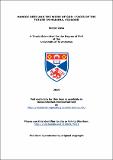Files in this item
Manioc beer and the Word of God : faces of the future in Makuma, Ecuador
Item metadata
| dc.contributor.advisor | Gow, Peter | |
| dc.contributor.author | Cova, Victor | |
| dc.coverage.spatial | 253 | en_US |
| dc.date.accessioned | 2015-07-27T10:50:36Z | |
| dc.date.available | 2015-07-27T10:50:36Z | |
| dc.date.issued | 2015 | |
| dc.identifier.uri | https://hdl.handle.net/10023/7031 | |
| dc.description.abstract | How can anthropologists describe the relationship between Christian and Amazonian ontologies? Based on a 13 months-long fieldwork, this ethnography of the Evangelical mission town of Makuma in lowland Ecuador describes the relationship between the Shuar and North American missionaries. In Makuma “Christianity” and “Shuar” both refer to ways of relating particularity to a universal but put different emphases either on the body or on belief, and on relation or on boundaries. I argue that these are constituted by “technologies of introjection of the future”. For Shuar people, these technologies range from manioc beer to powerful hallucinogens which serve to anchor a perceived chronic instability of Amazonian bodies. Shuar Christians avoid using any of these, which complicates their participation in social life. All the alternatives they have found revolve around the Bible. As another “technology of introjection of the future”, the Bible appears to Makuma Christians as a text addressed to them personally by a God come from a future beyond the future to help them live that future in the present. They translate the Bible into the Shuar language and document the world from the Bible’s perspective to stabilise the relationship between God, themselves, and Shuar people. Both “technologies of introjection of the future” are distinct but can be made to work together. I present various forms of cooperation between Shuar and missionaries (Bible translation, maintenance of a hydroelectric powerplant) alongside attempts to articulate a new relationship between the Shuar, God, and the Church that would bypass the missionaries (Islam, adventism, or indigenous churches). These are judged by the Shuar for their effects on kinship. I conclude the thesis with a more abstract definition of “technologies of incorporation of the future” which enables their articulation with capitalism and colonialism and opens up broader comparative horizons. | en_US |
| dc.language.iso | en | en_US |
| dc.publisher | University of St Andrews | |
| dc.subject.lcc | F3722.1J5C7 | |
| dc.subject.lcsh | Shuar Indians--Religion | en_US |
| dc.subject.lcsh | Shuar indians--Ecuador--Makuma | en_US |
| dc.subject.lcsh | Shuar Indians--Missions--Ecuador--Makuma | en_US |
| dc.subject.lcsh | Evangelicalism--Ecuador--Makuma | en_US |
| dc.subject.lcsh | Hallucinogenic drugs and religious experience--Ecuador--Makuma | en_US |
| dc.title | Manioc beer and the Word of God : faces of the future in Makuma, Ecuador | en_US |
| dc.type | Thesis | en_US |
| dc.contributor.sponsor | Fonds Lelong | en_US |
| dc.type.qualificationlevel | Doctoral | en_US |
| dc.type.qualificationname | PhD Doctor of Philosophy | en_US |
| dc.publisher.institution | The University of St Andrews | en_US |
This item appears in the following Collection(s)
Items in the St Andrews Research Repository are protected by copyright, with all rights reserved, unless otherwise indicated.

